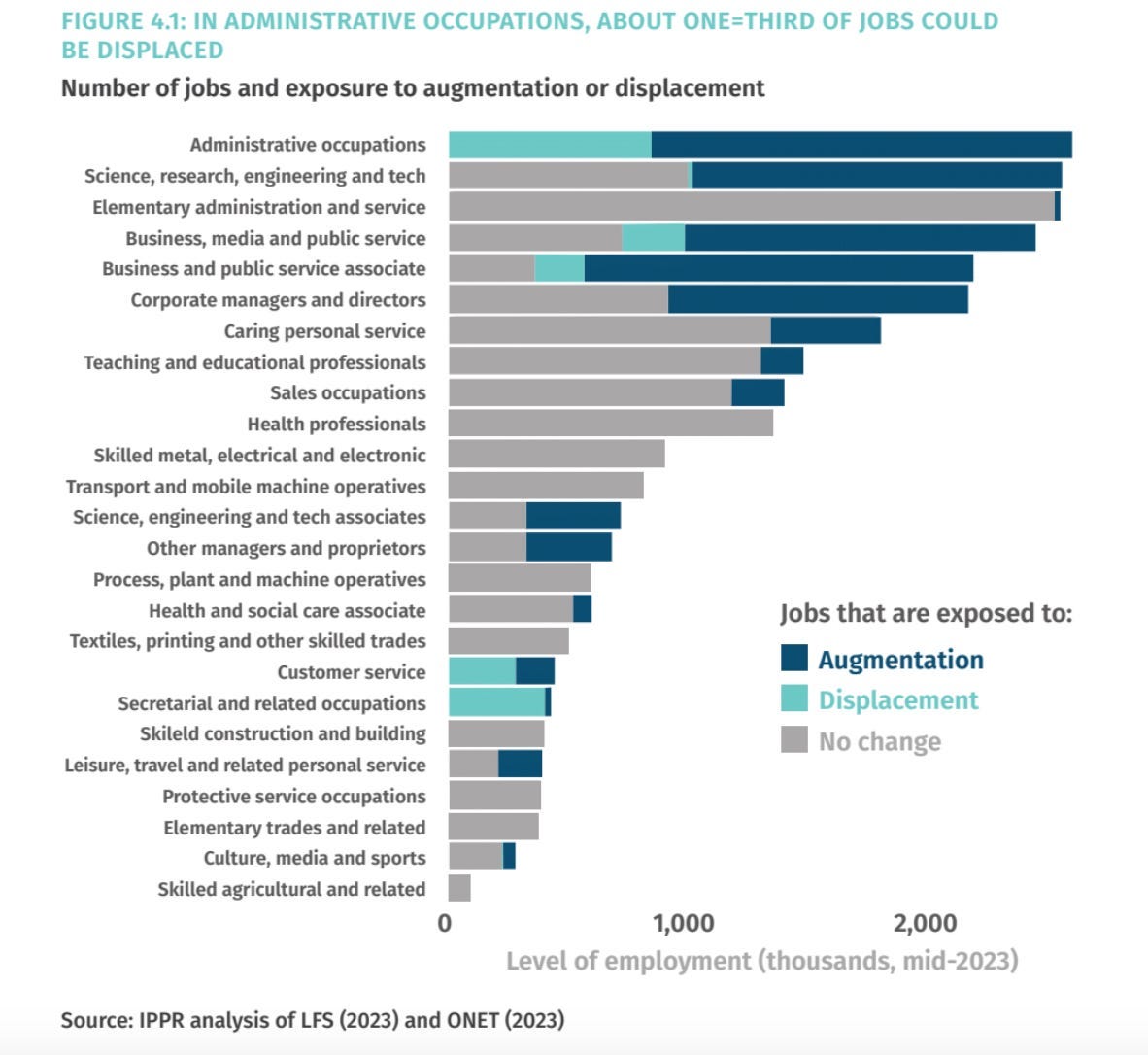All you need is love (and a little AI)
How do you respond to an existential threat that might threaten your livelihood?
First step: take a breath and assess whether it’s quite as damaging as portrayed.
The Times They Are A-Changin'
As this analysis by the Institute of Public Policy shows, few industries and jobs will be unaffected by the growth of AI:
But change isn’t inherently bad, as George Lee, ‘Tech Guru’ at Goldman Sachs said recently:
“The history of technology suggests some jobs will be abstracted away — and yet new jobs, new functions, new opportunities will emerge that you can’t imagine today. It’s going to create enormous opportunity.”
Great. So, the next logical step would be to grasp that opportunity. To ensure that whatever shape your future career takes, you’re doing something to which you can bring your unique perspective and set of skills. To embrace your human-ness.
In my book, Work/Life Flywheel, I wrote:
“As technology and automation change the nature of jobs over the coming decades, the defining contribution of humans to business and society will be characteristics like creativity, context and critical thinking.”
George Lee echos this, explaining how Goldman is exploring the possibilities (and, inevitably, the significant cost-savings) of AI while also emphasising the importance of those human skills:
“Some of the skills that are really salient to cooperate with this new type of intelligence in the world are critical thinking, understanding logic and rhetoric, the ability to be creative. It will allow non-technical people to accomplish a lot more — and, by the way, begin to perform what were formerly believed to be technical tasks.”
So, where should you start?
More Than a Feeling
Let’s think about the job of a typical manager.
Learning how new technology and tools can help augment how we hire, develop and lead teams is exciting. But the critical word there is augment. Because, when it comes down to it, you can’t manage people with technology alone. They are people, after all.
Every individual has different ambitions, personalities, and life circumstances.
With this in mind, I listened back to my podcast interview with Marcus Buckingham this week. His background is in research and data, working for organisations like Gallup to understand what drives engagement and performance.
Marcus advises team leaders to focus on the most human quality of all: love.
An incongruous word to use in a work context. But it makes sense when you think about it. If I asked you to describe the aspects of your job that leave you most fulfilled and excited, chances are, you’d say “love”.
In my case:
I love learning from people with a completely unique perspective.
I love recording podcasts when the hour flies by in what feels like minutes.
I love working on a problem that hurts my head and then solving it when stacking the dishwasher.
What about you? When did you last sit down to think about what you love about your job? Let alone what your team loves.
And, trust me, love matters.
Love Actually boosts performance
Marcus, author of Love + Work, explains that employees who find what he describes as ‘red threads’ perform better.
Because loving what you do correlates with behaviours such as loyalty, advocacy, engagement and productivity. Not every minute of every day, by the way. Spending roughly 20% of your work is enough. And if you still think this sounds a bit fluffy, Gallup’s research shows that highly engaged business units experience 21% higher profitability than those with low engagement.
This is why I’ve been experimenting with using AI to help me discover my ‘red threads’.
Whether it’s a conversation with a new customer, a talk I’ve done at an event, or a breakthrough I’ve made with my team, I track them using an AI-enabled tool I’ve built.
Here’s what I’ve found:
AI makes capturing important moments much quicker and easier. It’s efficient and simple. I’m logging significant things I would otherwise forget at the end of the week. But it doesn’t tell me everything.
The greatest revelations come when I stop and reflect on these highlights. On why I decided to capture those moments in the first place. Why they matter. What trends I notice in the things that bring me joy.
Yes, understanding how to harness AI is helping me save time, be more productive, and create new opportunities. But future-proofing my career isn’t all about learning new skills. It’s also about tapping into those I already have and finding love in what I do.
That’s how I’m responding to the rise of AI. How about you?
Enjoy the weekend.
Ollie
Thanks to Hung Lee for pointing me in the direction of the research in this newsletter. If you’re not already subscribed to his excellent weekly Recruiting Brainfood newsletter, I suggest fixing that ASAP.







